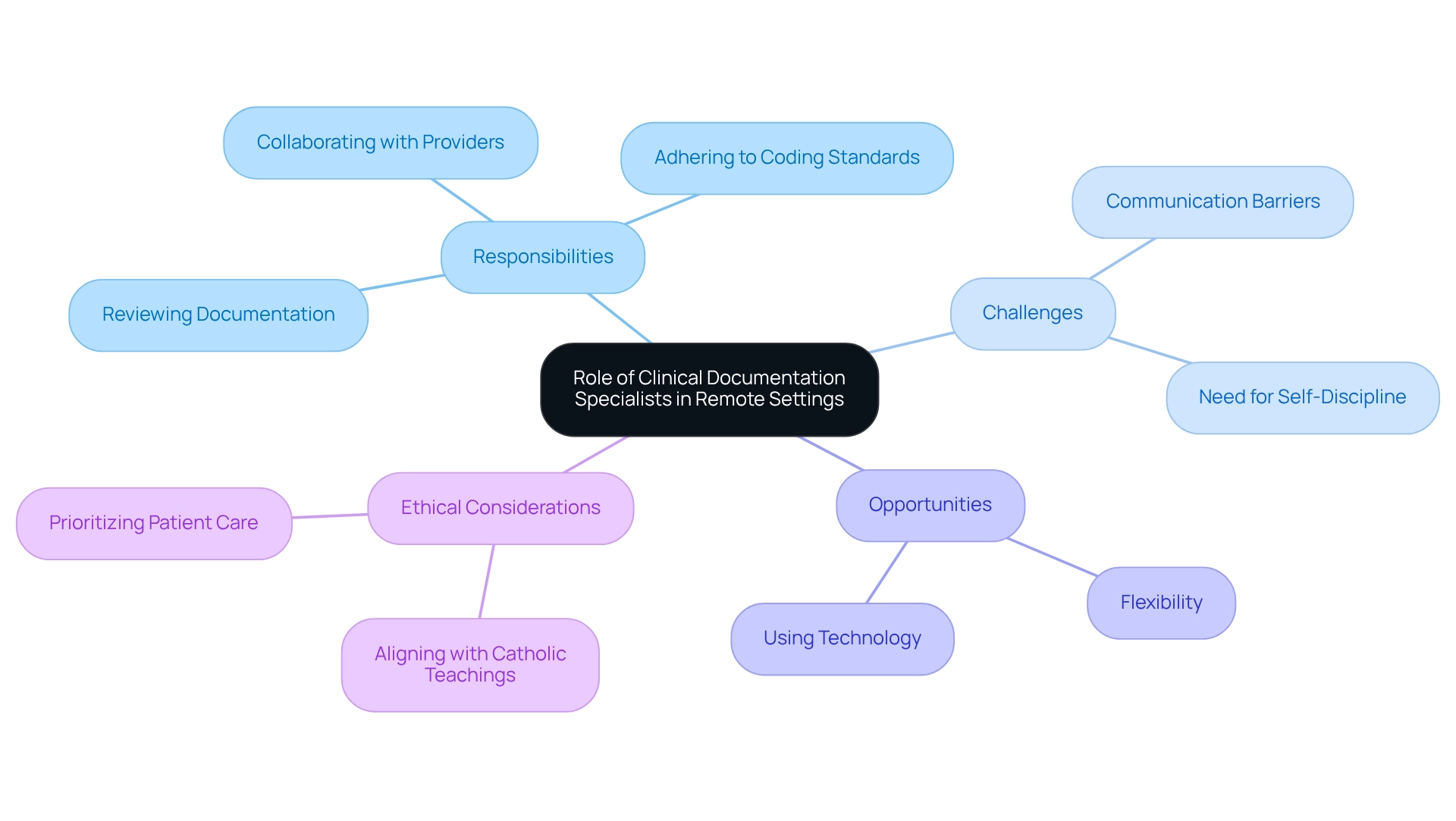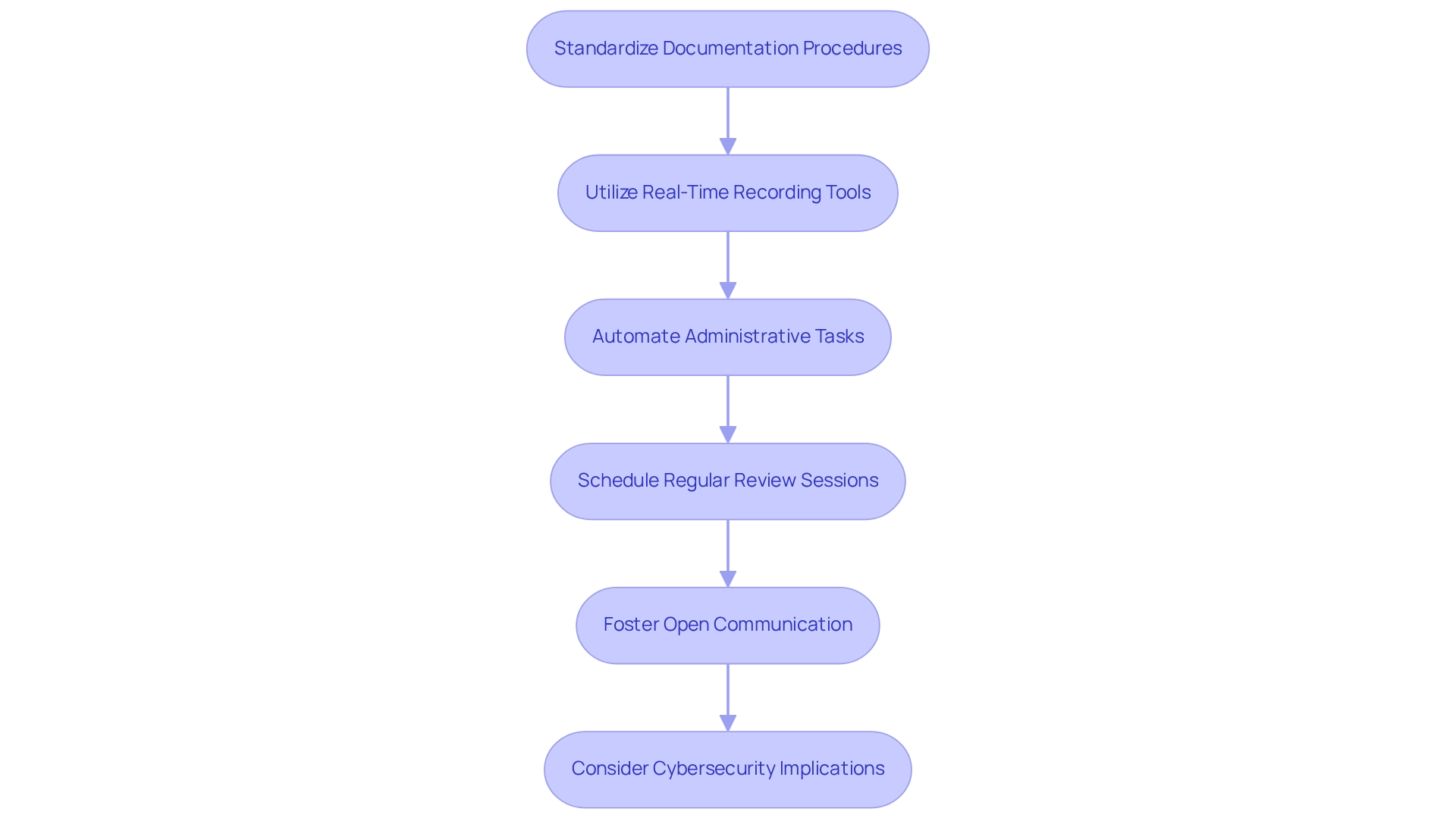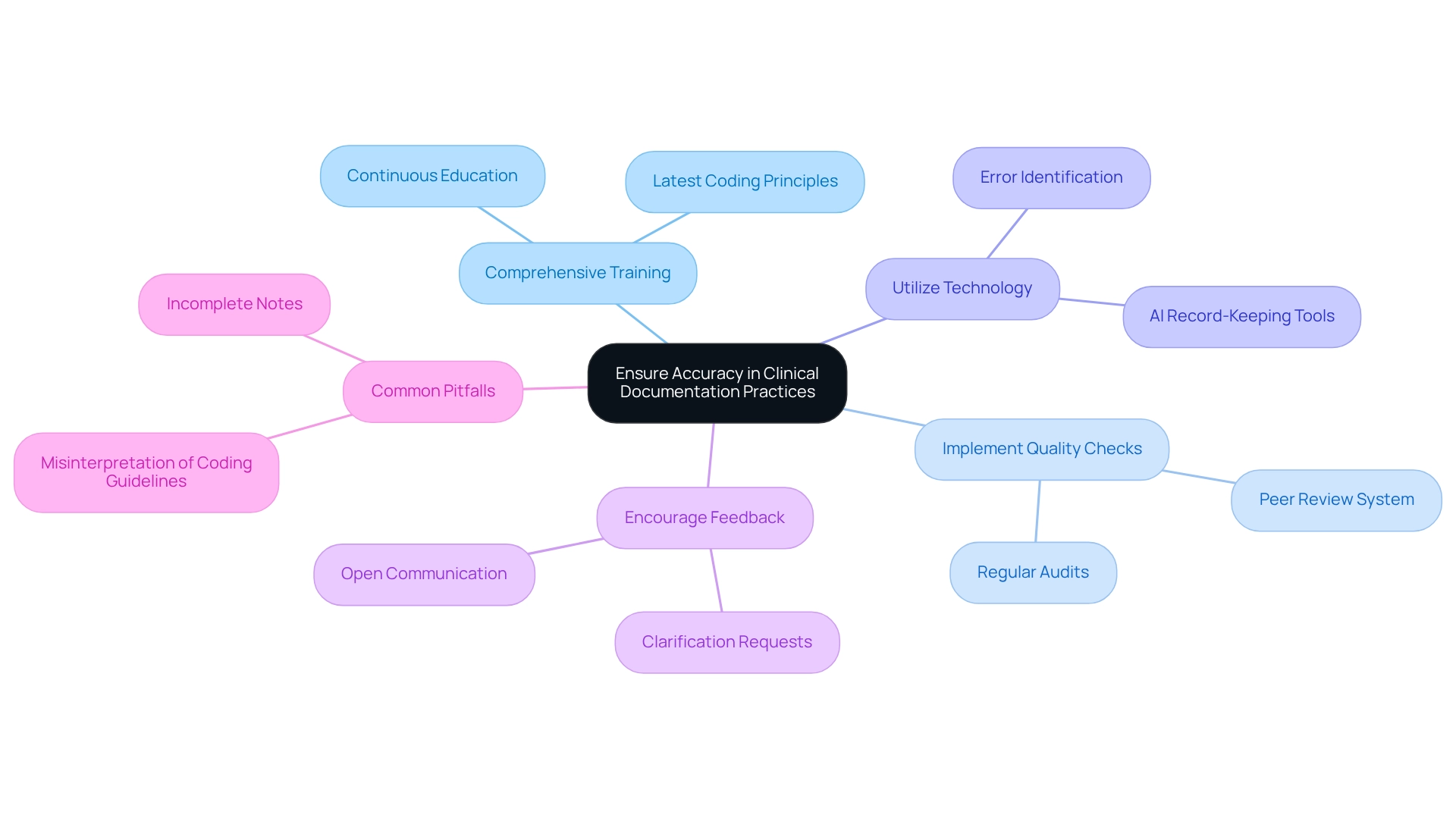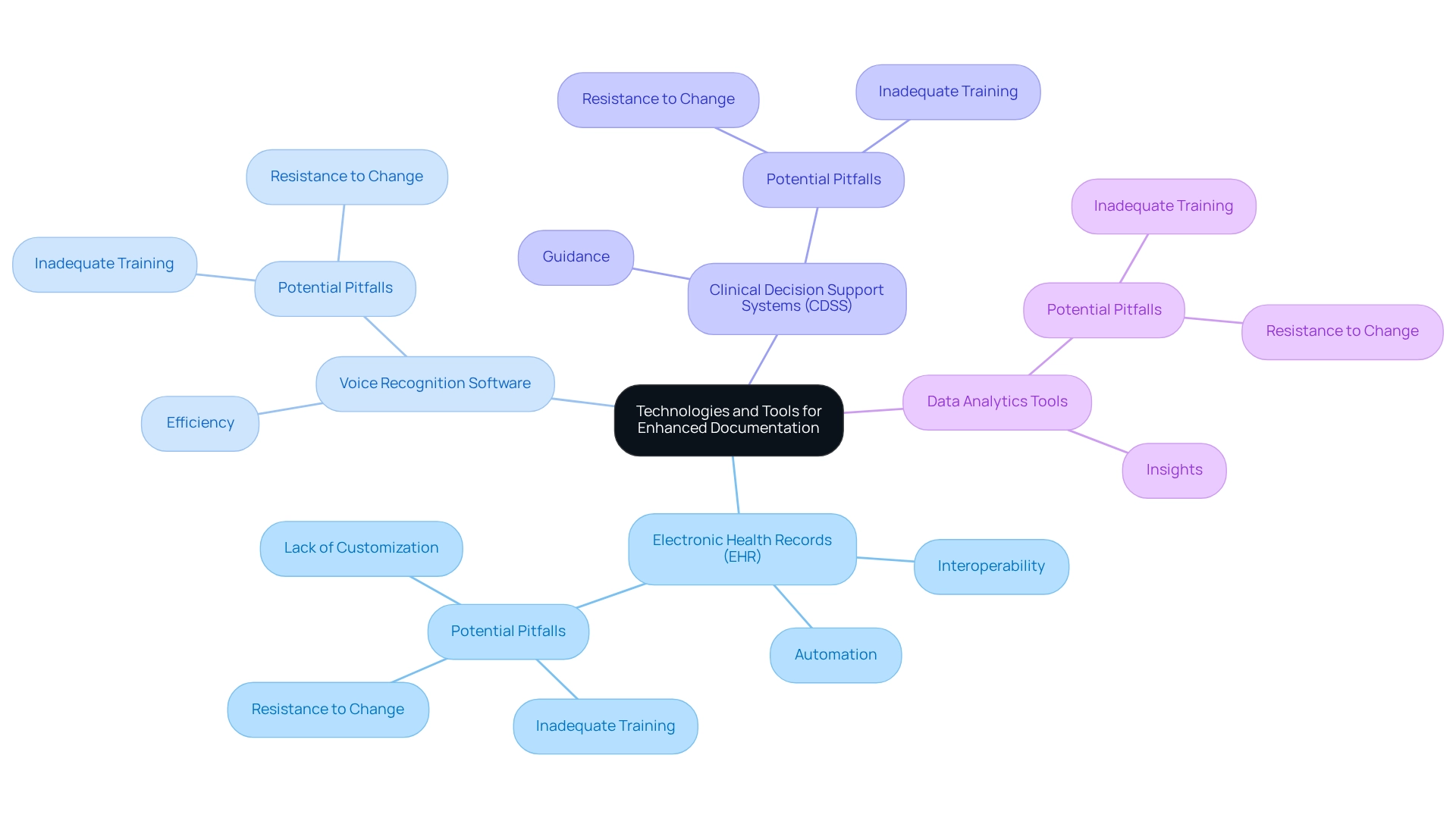Overview
This article addresses the emotional challenges faced by Clinical Documentation Specialists (CDS) working from home. It acknowledges how the pressures of accuracy and efficiency can weigh heavily on healthcare providers, impacting their ability to focus on patient care.
To alleviate these burdens, effective strategies can be implemented. These include:
- Standardized procedures
- Real-time recording tools
- Advanced technologies like Electronic Health Records (EHR)
These solutions not only streamline workflow but also ensure that patient care remains at the forefront.
Imagine the relief that comes from reduced administrative burdens and improved efficiency. Case studies have shown that when CDS utilize these tools, they can devote more time to what truly matters: the care of their patients.
We encourage you to explore these strategies further. By embracing technology and standardized procedures, you can transform your documentation practices and ultimately improve patient outcomes. Remember, you are not alone in this journey; support and resources are available to help you succeed.
Introduction
In the evolving landscape of healthcare, Clinical Documentation Specialists (CDS) are becoming indispensable, especially in remote settings. Their expertise ensures that patient records are not only accurate but also compliant with coding standards, which is critical for effective patient care.
However, healthcare providers often face emotional challenges, navigating the complexities of documentation amidst administrative burdens. As healthcare increasingly embraces technology, the role of CDS is being redefined, presenting both challenges and opportunities.
From overcoming communication barriers to leveraging advanced tools like AI and electronic health records, this article delves into the multifaceted responsibilities of CDS. How can they enhance documentation efficiency and accuracy? By exploring innovative solutions and best practices, we can highlight how CDS can navigate the complexities of remote work while maintaining the integrity of clinical documentation.
Ultimately, this leads to improved patient outcomes. Together, we can support the vital work of CDS in ensuring that every patient receives the care they deserve.
Define the Role of Clinical Documentation Specialists in Remote Settings
Clinical Documentation Specialists (CDS) hold a vital position in ensuring that medical records accurately reflect patient diagnoses, treatments, and outcomes. In remote medical settings, their responsibilities include reviewing and analyzing clinical documentation, adhering to coding standards, and collaborating with providers to resolve discrepancies. However, the shift to remote work, such as clinical documentation specialist roles from home, introduces challenges like communication barriers and the need for self-discipline. Yet, it also presents an opportunity for flexibility and the use of technology to enhance efficiency.
Challenges Faced by Startups:
- Many medical startups face resistance to innovation from providers who worry about maintaining quality care.
- The risk-averse nature of the medical field can impede the adoption of new technologies, making it crucial for startups to showcase the value and reliability of their solutions.
For instance, CosmaNeura, the only firm developing AI solutions for the billion-dollar faith-centered medical sector, has shown that its AI solutions lead to significant time savings for clinicians and improved record accuracy. A case study illustrates how these AI tools have optimized workflows, allowing CDS to dedicate more time to patient care while preserving the integrity of clinical documentation. By addressing providers' concerns about innovation, these AI solutions help to overcome resistance to change, ultimately enhancing care for individuals.
Statistics reveal that effective remote work strategies can increase productivity among those in clinical documentation specialist roles from home, benefiting the healthcare system as a whole. Moreover, the ethical dimensions of CDS efforts are essential, aligning with Catholic teachings to ensure that patient care remains the primary focus while upholding the integrity of clinical records.
As we navigate these challenges together, it’s important to recognize the emotional toll that administrative burdens can take on healthcare providers. Let’s continue to support one another in fostering an environment where patient care is prioritized, and innovative solutions are embraced.

Implement Strategies for Efficient Clinical Documentation
To improve efficiency in clinical records, Clinical Documentation Specialists (CDS) can adopt several key strategies that not only enhance their workflow but also support the compassionate care they provide:
- Standardize Documentation Procedures: Creating templates and checklists is crucial for ensuring uniformity and thoroughness in written records. This practice not only reduces the time spent on each record but also minimizes the risk of omitting critical information, which is vital for quality measurement and research. Recent studies indicate that standardized record-keeping processes can result in a 30% boost in efficiency, greatly influencing overall healthcare delivery.
- Utilize Real-Time Recording Tools: Implementing tools that facilitate real-time records during client interactions can significantly streamline workflows. This approach ensures that information is captured accurately and promptly, enhancing clinical efficiency and reducing the administrative burden on providers. The integration of real-time tools has been shown to reduce documentation errors by up to 25%, thus improving outcomes for individuals. By utilizing AI technology, these tools can further enhance diagnostic accuracy and elevate care for individuals.
- Automate Administrative Tasks: Incorporating automation in appointment scheduling, medical record management, and billing processes can greatly reduce the time spent on these tasks. Automation not only improves efficiency but also enables CDS to focus more on caring for individuals instead of administrative responsibilities.
- Schedule Regular Review Sessions: Allocating dedicated time for assessing and revising records is essential. This practice helps maintain accuracy and allows for timely corrections of any discrepancies, thereby reinforcing the integrity of patient records. Regular reviews also align with the continuous improvement methodologies currently emphasized in Clinical Decision Support Systems (CDSS).
- Foster Open Communication: Establishing clear communication channels with healthcare providers is vital for facilitating quick clarifications and feedback on record-related issues. Regular check-ins can proactively address challenges, ensuring that documentation remains aligned with clinical needs. This open dialogue is essential for maintaining ethical standards in client care, as it allows for immediate adjustments based on provider feedback.
- Consider Cybersecurity Implications: As highlighted in recent case studies, the role of cybersecurity in CDSS is essential for safeguarding individual data and ensuring system functionality. By standardizing record-keeping processes, CDS can enhance data privacy and operational integrity, which are crucial in today’s digital medical environment.
By implementing these strategies, clinical documentation specialists working from home can significantly improve their efficiency, allowing them to concentrate more on caring for individuals and less on administrative duties. This shift not only enhances job satisfaction but also aligns with the ethical standards of patient care, reinforcing the compassionate spirit of healthcare.

Ensure Accuracy in Clinical Documentation Practices
Ensuring precision in clinical records is not just a task; it’s a commitment to patient care that requires a multifaceted approach.
- Comprehensive Training: Continuous education for Clinical Documentation Specialists (CDS) on the latest coding principles and standards is essential. This equips them to manage complex cases effectively while maintaining compliance with evolving regulations. How can we ensure our CDS feel empowered in their roles?
- Implement Quality Checks: Regular audits of records for accuracy and completeness are vital. Establishing a peer review system can help identify common errors and highlight areas for improvement, fostering a culture of continuous enhancement. Imagine the impact of teamwork in refining our processes.
- Utilize Technology: Advanced record-keeping tools that incorporate artificial intelligence can significantly enhance accuracy. These tools identify possible mistakes and recommend adjustments, lowering the cognitive burden on CDS and improving the overall quality of records. As AI systems learn from data inputs, the number of reporting errors is likely to decline, leading to enhanced coding practices and improved outcomes for individuals.
- Encourage Feedback: Cultivating an environment where feedback is actively sought and valued is crucial. CDS should feel authorized to request clarification from providers when records seem unclear or lacking. This ensures that all files accurately represent the care provided. Have we created a space where questions are welcomed?
- Common Pitfalls: It’s important to be aware of frequent errors in clinical record-keeping practices, such as incomplete notes or misinterpretation of coding guidelines. Addressing these pitfalls can further enhance the accuracy of clinical records. By prioritizing these strategies, CDS can ensure that clinical records accurately reflect the nature of patient care, which is essential for effective treatment and compliance.
Moreover, case studies have revealed that initiatives focused on improving record accuracy can lead to substantial increases in charge rates, highlighting the financial and operational advantages of careful record-keeping practices. As noted by Marc T. Seligson, working closely with billing and coding staff, note templates are continually reevaluated and updated as necessary to ensure the highest level of service is documented and that each note contains the requisite elements necessary to bill for the E/M services provided.

Leverage Technology and Tools for Enhanced Documentation
To enhance clinical documentation, Clinical Documentation Specialists (CDS) should consider the following technologies and tools:
-
Electronic Health Records (EHR): Implementing EHR systems is crucial for easy access to individual information and facilitating real-time updates. EHRs have been shown to decrease the time needed to retrieve individual information by as much as 80%, optimizing workflows and enhancing communication among medical providers. Key features include:
- Interoperability: Approximately 70% of hospitals engage in interoperable data exchange activities, enhancing clinical documentation practices by ensuring that patient information is readily available and easily shared across systems.
- Automation: By automating administrative tasks, EHRs allow healthcare providers to reclaim valuable time to focus on delivering high-quality patient care.
-
Voice Recognition Software: The incorporation of voice-to-text technology enables CDS to dictate notes during client interactions, greatly minimizing record-keeping time while ensuring precision. Key features include:
- Efficiency: This technology enhances efficiency and allows providers to concentrate more on patient care rather than administrative tasks, thereby improving patient outcomes.
-
Clinical Decision Support Systems (CDSS): Utilizing CDSS can aid in record-keeping by offering pertinent clinical guidelines and reminders derived from individual data. Key features include:
- Guidance: This ensures that documentation meets clinical standards and contributes to improved patient outcomes, as it helps clinicians make informed decisions during patient care.
-
Data Analytics Tools: Employing analytics tools allows medical providers to track record trends and pinpoint areas for enhancement. Key features include:
- Insights: These insights can guide targeted training and process enhancements, ultimately leading to better documentation practices and reduced stress for healthcare providers.
While these technologies offer significant benefits, common pitfalls in their implementation include:
- Inadequate Training: Staff may not receive sufficient training to effectively use the new systems.
- Resistance to Change: Some staff may be hesitant to adopt new technologies, impacting overall efficiency.
- Lack of Customization: Failing to customize systems to meet specific practice needs can hinder their effectiveness.
Addressing these challenges is essential for successful integration. A practical example of effective technology use can be seen in the case of a mid-sized medical practice that implemented EHR and voice recognition software. By doing so, they reduced their documentation time by 50%, allowing clinicians to spend more time with patients and improving overall care quality. Moreover, clinical documentation specialists working from home can effectively leverage these technologies to enhance their documentation practices, resulting in improved efficiency and better patient care outcomes. The successful implementation of EHR solutions, as demonstrated by eClinicalWorks, which serves over 850,000 healthcare professionals and generates an annual revenue of $1.3 billion, underscores the transformative impact of these tools in the healthcare technology sector.

Conclusion
The evolving role of Clinical Documentation Specialists (CDS) in remote healthcare settings is vital for maintaining accurate and compliant patient records. By employing standardized documentation processes, utilizing real-time tools, and automating administrative tasks, CDS can significantly enhance efficiency while ensuring that patient care remains the primary focus. These strategies not only streamline workflows but also alleviate the administrative burdens that often hinder healthcare providers.
Addressing the challenges posed by remote work, such as communication barriers and the need for self-discipline, is essential for CDS to thrive in this environment. How can we better support them? Leveraging advanced technologies, including Electronic Health Records and AI-driven tools, can further improve documentation accuracy and efficiency. These innovations empower CDS to concentrate on patient care rather than getting bogged down by administrative duties, ultimately leading to better patient outcomes.
Moreover, ensuring accuracy through ongoing training, quality checks, and fostering open communication is paramount for effective clinical documentation. By prioritizing these elements, CDS can navigate the complexities of their role and uphold the integrity of clinical records. As healthcare continues to embrace technology, the importance of CDS in delivering high-quality patient care cannot be overstated. Supporting their work is crucial for improving patient outcomes and ensuring that every patient receives the care they deserve. Let’s continue to champion the efforts of CDS, recognizing their invaluable contribution to patient care and the healthcare system as a whole.




